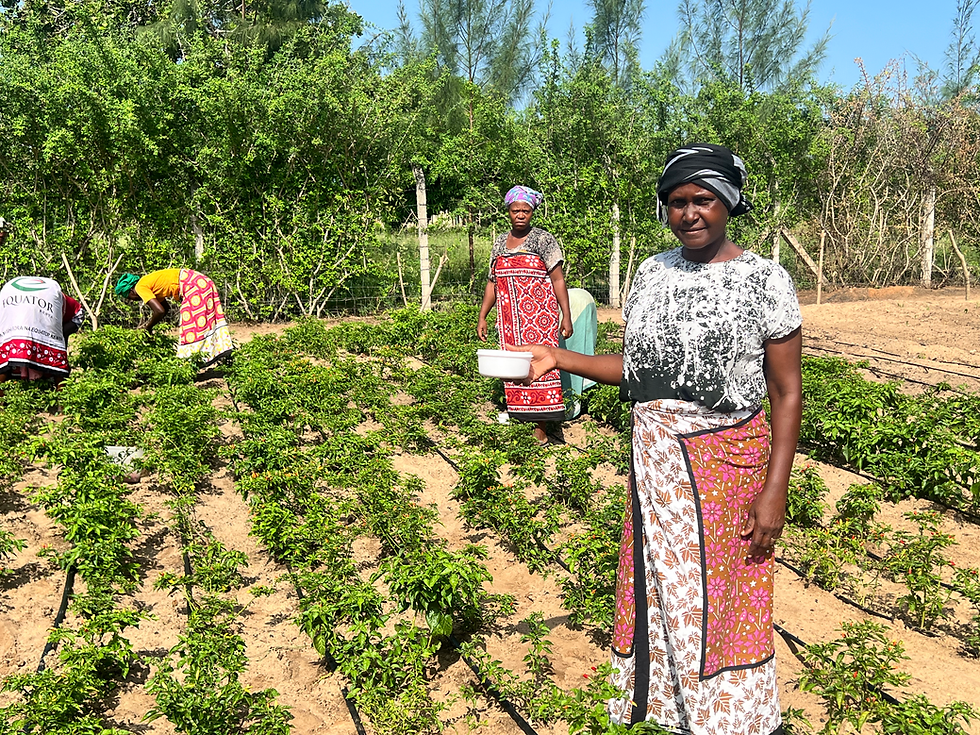The Role SUED has Played in Championing for Access to and Control over Assets and Resources for Small Scale Women Farmers in Kilifi
- Sep 4, 2025
- 3 min read

Despite Kenya’s progressive legal framework that guarantees equal rights to land and property for both men and women, gender disparities in access and control over productive resources persist—particularly in rural areas like Kilifi County. Customary and traditional practices continue to favour male inheritance, leaving many women without secure land tenure or access to financial assets. This lack of economic autonomy limits women’s decision-making power and increases their vulnerability to poverty.
Recognizing this challenge, the UK Government’s Sustainable Urban Economic Development (SUED) programme has taken deliberate steps to empower women farmers in Kilifi by enhancing their access to productive assets and integrating them into value chains that offer sustainable income opportunities.
Empowering Women Through Agriculture
In partnership with Equator Kenya Limited (EKL), SUED has supported the expansion of a farmer network in Kilifi County to over 8,500 small-scale farmers, 70% of whom are women. This initiative is not just about increasing numbers—it’s about transforming lives. By integrating women into the chilli value chain, SUED and EKL are enabling them to gain control over land, access financial services, and participate in decision-making processes that affect their livelihoods.
A Milestone Investment: The Chilli Processing Plant
A major milestone in this journey is the commissioning of a Chilli Processing Plant by EKL, supported by SUED and the Kilifi County Government. This facility is a game-changer for women farmers, offering them a reliable market for their produce, reducing post-harvest losses, and creating employment opportunities.
British High Commissioner to Kenya, Neil Wigan, remarked: “This processing plant exemplifies the UK’s commitment to growing Kilifi’s agricultural economy. By targeting the chilli value chain—chosen for its high yield potential, climate resilience, and strong women participation—Equator Kenya Limited will formalize market linkages, directly employ local farmers, while stimulating demand for agricultural inputs and services across the region.”
Climate-Smart and Inclusive Growth
The chilli processing plant is not only economically empowering—it is also climate-smart. With a total investment of KES 230 million, including KES 43 million in seed funding from the UK Government, the facility has:
Transitioned to solar energy, meeting 90% of its energy needs
Implemented climate-smart technologies to support farm management and communication
Reduced post-harvest losses through expanded processing capacity and product diversification
Introduced carbon sequestration practices to improve soil health
These innovations are helping women farmers build resilience against climate change while increasing their productivity and income.
Government Support and Local Impact
The Kilifi County Government has played a crucial role by creating an enabling environment for EKL’s operations. Through its Agricultural Department, it provides extension services that help farmers especially women adopt high-yielding, disease-resistant crops and sustainable farming practices.
Deputy Governor Hon. Flora Chibule shared: “We deeply appreciate the UK Government’s support; it demonstrates the commitment between our governments to sustainable energy and climate resilience. The chilli processing plant is a strategic investment that enhances community resilience, ensures sustainable livelihoods, and supports our environmental sustainability goals.”
A Model for Inclusive Development
SUED’s work in Kilifi is a powerful example of how targeted investments in agricultural value chains can unlock economic opportunities for women. By supporting infrastructure, de-risking private sector investments, and promoting climate resilience, SUED is not only boosting local economies but also challenging long-standing gender inequalities.
EKL Director, Abubakar Ali, noted: “The UK Government’s support through SUED is ensuring that we are able to extend our relationship with farmers across Kilifi. More are learning best practices of chilli farming, enabling them to harvest chillies suitable for the export market.”
Looking Ahead
This is SUED’s second value-chain project in Kilifi, following successful investments in fruit drying and cassava processing. As the programme continues, its focus remains clear: to create jobs, promote inclusive economic growth, and ensure that women—especially small-scale farmers—have the tools, resources, and support they need to thrive.




Comments